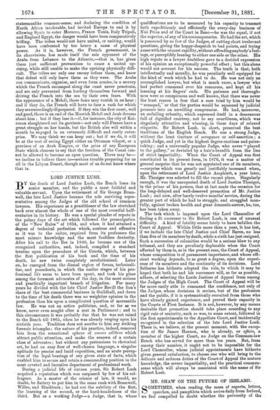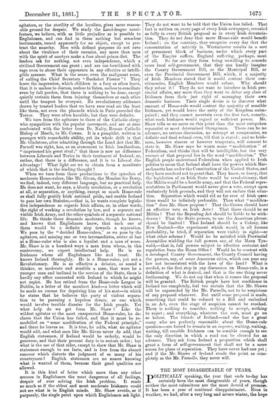MR. SHAW ON THE FUTURE OF IRELAND
OMETIMES, when reading, the masa of reports, letters, 10 speeches, and pamphlets which arrive daily from Ireland, we feel compelled to doubt whether the perversity of the
agitators, or the sterility of the loyalists, gives more reason- able ground for despair. We study the Land-league mani- festoes, we believe, with as little prejudice as is possible to Englishmen, and can find in them nothing but senseless incitements, issued apparently for no object, except to pro- tract the anarchy. Men with defined purposes do not rave about the virulence of their enemies, any more than men with the spirit of martyrs make a fuss about prison diet. The leaders ask for nothing, not even independence, which a civilised Government can grant ; and are too bewildered with rage even to abuse their opponents in any effective or intelli- gible manner. What is the sense, even the malignant sense, of calling the Chief Secretary " Buckshot Forster "? They leave the impression, which children in a fury so often leave, that it is useless to discuss, useless to listen, useless to conciliate even by full pardon, that there is nothing to be done, except quietly restrain them from injuring themselves or each other until the tempest be overpast. No revolutionary addresses drawn by trusted leaders that we have ever read are the least like them, not even the placards which in Paris preceded the Terror. They were often horrible, but they were definite.
We turn from the agitators to those of the Catholic clergy who sympathise with the popular movement, and are at once confronted with the letter from Dr. Nulty, Roman Catholic Bishop of Meath, to Mr. Cowan. It is a pamphlet, written in passages with remarkable ability, yet its whole drift is that Mr. Gladstone, after admitting through the Land Act that Mr. Parnell was right, has, as an atonement to Irish landlordism, " imprisoned his great rival ;" that there is now no difference between Liberals and Tories in their treatment of Ireland, or, rather, that there is a difference, and it is to Liberal dis- advantage! What light are we to obtain from a manifesto of which that is the leading thought ?
When we turn from these productions to the speeches of moderate Home-rulers, like Mr. Givan, the Member for Derry, we find, indeed, very different language, but no practical help. He does not want, he says, a bloody revolution, or a revolution at all, or separation, or anything, except so much Home-rule as shall fully gratify Irish national pride, and enable Ireland to pass her own Statutes,—that is, he wants complete legisla- tive independence as regards Irish affairs, or, in other words, the right of working a revolution by law, and a separate and visible Irish Army, and the other symbols of a separate national life. He thinks those demands moderate, though he knows, and knows that Englishmen know, that each one of them would be a definite step towards a separation. We pass by the " decided Home-rulers," as we pass by the agitators, and missing one or two intermediates, arrive at last at a Home-ruler who is also a loyalist and a man of sense. Mr. Shaw is in a hundred ways a man from whom, in this controversy, we expect intellectual help. He is an Irishman whom all Englishmen like and trust. He knows Ireland thoroughly. He is a Home-ruler, yet not a Revolutionary. He is so effective a debater, so sound a thinker, so moderate and sensible a man, that were he a younger man and inclined to the service of the State, there is hardly any office connected with Ireland to which he might not aspire. He has retired from the Home-rule League in Dublin, in a letter of the manliest kind—a letter which will be made an excuse for depriving him of his seat—in which he states that he believes the party of violent separa- tion to be pursuing a hopeless dream, or one which would involve terrible disaster for the Irish people. Yet what help do we get from Mr. Shaw ? Like the wildest agitator or the most exasperated Home-ruler, he de- clares that the Union has failed, and that it must be re- modelled on " some modification of the Federal principle," and there he leaves us. It is true, he adds, what no agitator would add, and what men like Mr. Givan never do add, that English statesmen, if Ireland would be orderly, would be generous, and that their present duty is to restore order ; but what is the use of that rider, except to show that Mr. Shaw is statesman enough to see facts, and is free from the absurd rancour which distorts the judgment of so many of his countrymen ? English statesmen are no nearer knowing what is wanted of them, because their good qualities are allowed.
It is this kind of letter which more than any other arouses in Englishmen the most dangerous of all feelings, despair of ever solving the Irish problem. It reads so much as if the ablest and most moderate Irishmen could ,not see what is in English minds. Mr. Shaw avoids, as if purposely, the single point upon which Englishmen ask light. They do not want to be told that the Union has failed. That fact is written on every page of every Irish newspaper, revealed as fully in every British proposal as in every Irish denuncia- tion. They do not deny that more Home-rule would benefit Ireland ; on the contrary, they recognise every day that the concentration of activity in Westminster results in a sort of permanent block of business, under which every part of the Empire suffers, England suffering, perhaps, most of all. So far are they from being unwilling to concede more local self-government, that they can hardly imagine the County Government Bill, or the Municipal Bill, or even the Provincial Government Bill, which, if a majority of Irish Members stated that it would content their con- stituencies, English Members would refuse. Why should they refuse it ? They do not want to interfere in Irish pro- vincial affairs, any more than they want to debar any class of Irishmen from their just right of managing their own domestic business. Their single desire is to discover what amount of Home-rule would content the majority of sensible Irishmen, yet would leave the unity of the Kingdom unim- paired ; and they cannot ascertain even the first fact, namely, what such Irishmen would regard as sufficient power. Mr. Shaw tells us no more on this point than the most outspoken separatist or most determined Orangeman. There can be no advance, no serious discussion, no attempt at compromise, no definite and final refusal even, till that is stated ; and no Irish- man, however sincere or however temperate, will consent to state it. Mr. Shaw says he wants some " modification " of Federalism, and thinks that will be intelligible, but the very essence of that proposal lies in the word " modification." The English people understand Federalism when applied to Irish politics to mean that Ireland shall have the powers which Mas- sachusetts has under the Constitution of the United States, and they have resolved not to grant that. They know, or fancy, that the legislation of an Irish State would be revolutionary, that the Militia would be a hostile army, and that the Federal repre- sentatives in Parliament would never give a vote, except upon exclusively Irish grounds, and they will not endure that situa- tion. Separation which would rid us for ever of Irish ques-
tions would be infinitely preferable. Then what " modifica- tion " does Mr. Shaw propose ? That the Crown should have an effective veto on Irish Acts ? That there should be no Militia ? That the Repealing Act should be liable to be with- drawn ? That the State powers, to use the American phrase, should be limited ? That Ireland should be a Colony, like New Zealand—the experiment which would, in all human probability, be tried, if separation were visibly in sight—or what other scheme ? Would he be satisfied with Provincial Assemblies wielding the full powers, say, of the Manx Tyn- wald,—that is, full powers subject to effective restraint and regulation from the Home Office ? Would he be content with a developed County Government, the County Council having the powers, say, of some American cities, which can pass any law not inconsistent with the laws of the land ? What is needed, as the first step in any discussion on Home-rule, is a definition of what is desired, and that is the one thing never forthcoming. We do not say that when it comes the proposal will be granted. The British people have lost confidence in Ireland too completely, feel too certain that the Mr. Shams will be superseded by the Mr. Parnells, not to be suspicious of any proposal whatever. But until some proposal is made, something that could be reduced to a Bill and embodied in an Act, even the stage of suspicion cannot be reached. There is nothing to consider, nothing to accept, nothing to reject ; and everything, whatever the cost, must go on as before. The friends of Ireland—and she has a great many who are perfectly reasonable about the Home-rule question—are forced to remain in an impasse, waiting, waiting, waiting, till sensible Irishmen can be sensible enough to see the only direction in which a road can be cleared for an advance. They ask from Ireland a proposition which shall grant a form of self-government that shall not be a mere screen for plans of separation. They have never had one yet ; and if the Mr. Shaws of Ireland evade the point as com- pletely as the Mr. Paniells, they never will.







































 Previous page
Previous page